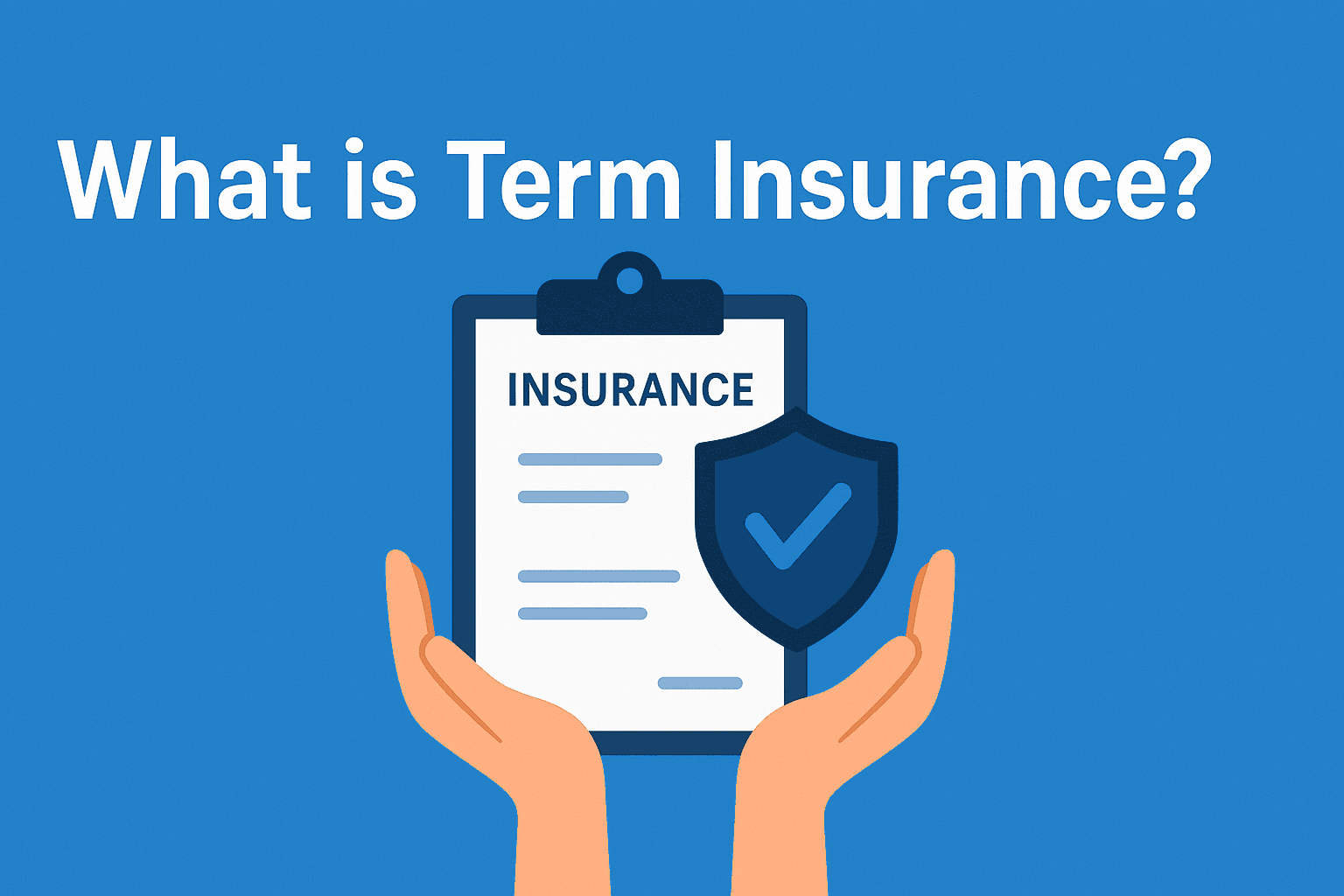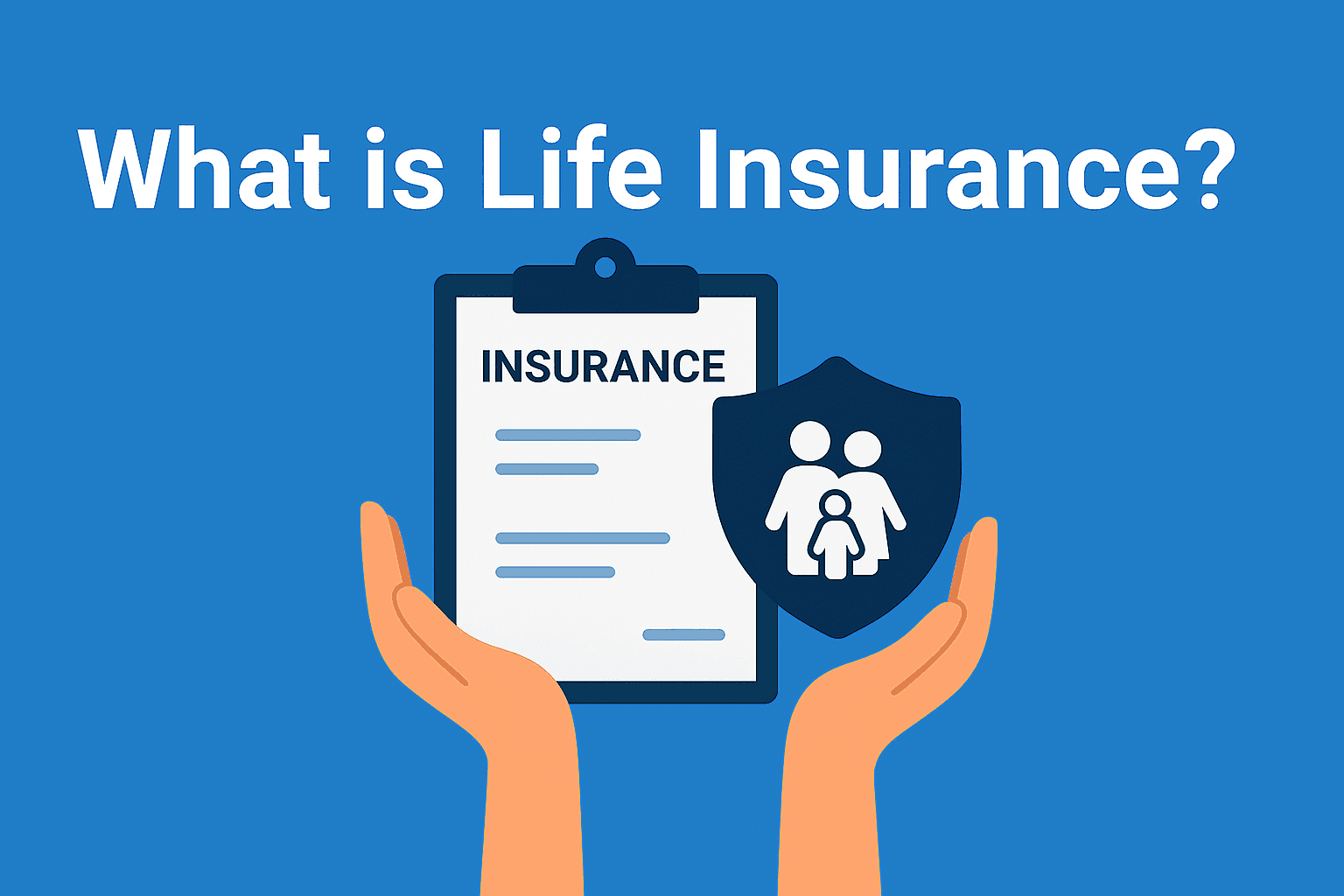Imagine this: you’re a working professional in India, newly married, maybe planning a family, and you’ve started thinking about financial security. Or perhaps you’re nearing retirement and want to ensure your family’s future remains protected. In either case, a common and critical question arises: term insurance vs life insurance, which one should you choose?
This guide will help you understand the difference between term insurance and life insurance, their pros and cons, and which plan might suit your goals better. By the end, you’ll gain the clarity needed to make a confident, informed decision.
When it comes to securing your family’s future, the debate around term insurance vs life insurance often leads to confusion. Many people assume both policies serve the same purpose, but that’s far from true. While both are types of life insurance, the difference between term insurance and life insurance lies in their structure, purpose, and cost.
Term insurance is designed to offer maximum coverage at the lowest possible premium, especially during income-generating years. On the other hand, whole life or permanent life insurance offers more than just protection — it combines savings and investment benefits under one umbrella.
Understanding the core features of term insurance vs life insurance will help you avoid costly mistakes. Whether you are planning short-term protection or a long-term legacy plan, your choice will influence your overall financial strategy. Let’s now break down their features side by side to help you make a smart, informed choice.
Term Insurance vs Life Insurance: Detailed Comperison
Before comparing policies, let’s first understand what life insurance does. At its core, insurance is a financial safety net; it ensures that if something unfortunate happens to you, your family doesn’t suffer financially.
There are two major types:
- Term Insurance
- Life Insurance (also called Whole Life or Permanent Life Insurance)
Understanding the life insurance and term insurance difference is vital so you don’t overpay for the wrong coverage or, worse, leave your family underinsured.
What is Term Insurance?

Term insurance is a pure protection plan that offers financial coverage for a specific time period (term), like 10, 20, or 30 years. If the policyholder passes away during this term, a lump sum death benefit is paid to the nominee.
Key Features of Term Insurance
- Affordable Premiums: Term plans are budget-friendly. For example, a 30-year-old non-smoker might pay as little as ₹500–₹1,000/month for ₹1 crore coverage.
- No Maturity Benefit: If you survive the term, there’s no return unless you add a “Return of Premium” rider.
- High Coverage: You can secure large sums (₹50 lakh to ₹2 crore) for a fraction of what whole life policies cost.
- Flexibility: Some plans offer renewal or conversion options.
Types of Term Insurance
- Level Term Plan: Fixed coverage throughout the term.
- Decreasing Term Plan: Coverage decreases over time — ideal for loans or EMIs.
- Convertible Term Plan: Can convert into life insurance without medical exams.
- Return of Premium Plan: Refunds your premiums if you outlive the policy.
Who Should Choose Term Insurance?
- Young professionals starting a family
- Parents with school-going kids
- People with home loans or personal liabilities
For instance, a 30-year-old with a ₹50 lakh home loan may choose a 20-year term policy worth ₹1 crore to secure their family’s future.
What is Life Insurance?

Unlike term insurance, life insurance (specifically whole life insurance) offers lifelong coverage. It also includes an investment or savings component, called cash value, which accumulates over time.
Key Features of Life Insurance
- Lifelong Coverage: As long as you pay the premiums, your coverage never expires.
- Cash Value: Part of your premium grows as savings or investments.
- Loan Facility: You can borrow against the policy in emergencies.
- Higher Premiums: Due to the dual benefit of protection + savings.
Types of Life Insurance
- Whole Life Insurance: Fixed premiums, guaranteed cash value.
- Endowment Plans: Offers lump-sum on maturity or death.
- ULIPs (Unit Linked Insurance Plans): Invested in equity/debt markets; returns vary with market performance.
- Money-Back Plans: Periodic returns along with life cover.
Who Should Choose Life Insurance?
- High-net-worth individuals (HNIs)
- People seeking wealth creation + insurance
- Business owners or those planning estate succession
For example, a 45-year-old business owner may choose a ₹25 lakh whole life policy for retirement planning while leaving a financial legacy.
Term Insurance vs Life Insurance: A Clear Comparison
| Feature | Term Insurance | Life Insurance (Whole/Permanent) |
|---|---|---|
| Coverage Period | Fixed term (10, 20, 30 years) | Lifelong |
| Premiums | Low (e.g., ₹500–₹1,000/month) | High (e.g., ₹5,000–₹15,000/month) |
| Death Benefit | Paid only if death occurs during term | Guaranteed payout |
| Maturity Benefit | None (unless with return-of-premium) | Yes – cash value/maturity sum |
| Tax Benefits | Section 80C & 10(10D) | Same |
| Flexibility | Limited | High (especially ULIPs and endowment) |
Cost Comparison
- Term Insurance: A 30-year-old may pay ₹600/month for ₹1 crore coverage for 20 years.
- Life Insurance: The same person could pay ₹6,000/month for ₹25–30 lakh coverage with cash value.
Flexibility & Use-Cases
| Parameter | Term Insurance | Life Insurance |
|---|---|---|
| Flexibility | Limited to renewal or conversion | Flexible premiums, investment, loans |
| Purpose | Pure protection | Protection + Wealth creation |
| Ideal For | Young families, loan protection | Retirement, legacy, tax-saving with returns |
Pros & Cons of Term Insurance
Pros
- Low premium, high coverage
- Simple to understand
- Ideal for temporary responsibilities (loans, kids’ education)
Cons
- No payout if you survive the term
- No cash value or savings
- Higher premium on renewal (post-term)
Which One is Better for You?
“When comparing term insurance vs life insurance, it’s important to consider your age and goals…”
The term vs life insurance decision depends on:
- Your financial goals: Just protection (term) or savings + protection (life)?
- Your age & responsibilities: Younger = term. Planning legacy = life.
- Your budget: Term is affordable; life insurance demands consistent higher premiums.
- Your investment comfort: Want to invest? ULIPs or endowments can help.
Hybrid Approach: Best of Both Worlds?
Many Indian financial advisors recommend a combo:
- Term Insurance for ₹1 crore (for loans, family protection)
- Small Life Insurance or ULIP for ₹10–15 lakh (for long-term wealth)
This way, you secure both short- and long-term needs.
Common Myths Busted
- Myth: Term insurance is a waste if I survive.
- Reality: Like car insurance — peace of mind is the true benefit.
- Myth: Life insurance is only for rich people.
- Reality: Affordable plans exist, especially endowment and money-back.
- Myth: I’m young, I don’t need insurance.
- Reality: Younger you are, lower the premium. Lock it early.
Tips to Choose the Right Insurance Plan
- Evaluate coverage needs: Include loans, kids’ future, family lifestyle.
- Compare plans online: Look for high claim-settlement ratio (95%+).
- Understand the fine print: Riders, exclusions, surrender terms.
- Reassess every few years: Upgrade cover as income/life evolves.
- Take expert help: A financial planner can guide you better.
Conclusion
“Ultimately, choosing between term insurance vs life insurance depends on your financial priorities…”
FAQs on Term Insurance vs Life Insurance
Which is better: Term Insurance or Life Insurance?
It depends on your goals. Term insurance is best for affordable, high-coverage protection for a fixed period. Life insurance is ideal for lifelong coverage with savings benefits. Choose based on your budget and long-term needs.
Which is better, whole life insurance or term insurance?
Term insurance is better for low-cost, high coverage over a limited time. Whole life insurance suits those who want lifelong protection and savings. Your choice should match your financial goals and life stage.
What are the disadvantages of term life insurance?
Term life insurance has no maturity benefit if you survive the term, offers limited flexibility, and renewal premiums can be high as you age.
What is the main difference between term and life insurance?
Term insurance offers coverage for a fixed period. Life insurance offers lifelong coverage plus savings.
Is term insurance cheaper?
Yes, term insurance is much cheaper than life insurance because it doesn’t offer savings.

Piyush is the founder of EarnEdgeNow.com. He writes about online earning, investments, and job updates to help Indian youth grow smarter with money.


